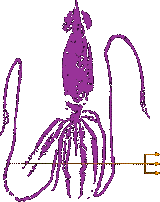

25 MARCH 2005
These octopus arms are made for walking
WASHINGTON — Octopuses, known for using camouflage to
avoid predators, have been observed apparently trying
to sneak away by walking on two arms
while pretending to be a bunch of algae.
Two kinds of octopus were seen to use different ways
of walking along the seafloor, researchers were
reporting in today's issue of the journal Science.
The movements were discovered by Christine Huffard
of the University of California Berkeley,
who was studying underwater videotapes of the animals.
As a defense, octopuses usually hold still to
camouflage themselves.
But by walking on two arms, these two types
were able to move quickly while using
their other arms to disguise themselves.
Two individuals of O. marginatus from Indonesia
wrapped six arms around themselves,
looking like a coconut on the seafloor.
They then used the two rear arms to move backward.
In Australia, O. aculeatus was seen raising
two arms above its head before lifting
four more and moving backward on the two remaining arms.
The researchers described it as
looking like "a clump of algae tiptoeing away."
The researchers believe the octopuses were
trying to flee from predators,
though they cannot be sure until they have
seen more examples of the behavior.
When Titan met Socratette
Blind dates are always uncomfortable,
so it's nice when you can smell and taste
someone before you actually have to meet.
Such was the case with Socratette and Titan,
two single octopuses who met romantically
(Barry White music and red roses included)
at the Seattle Aquarium this Valentine's Day,
after a couple of weeks of exchanging water
(and thus scents) between their tanks.
The annual event had its first success — in a
throwback to the 1970s, these swingers are expected
to get jiggy on their first meeting — last year.
This year, the public witnessed more 16-armed
wrestling, which the aquarium hopes will result in
up to 70,000 octo-babies.
"There is no safe sex for octopuses,"
says Seattle Aquarium biologist Dr. Roland Anderson.
After males reproduce they soon die.
Females lay eggs the size of rice grains
in sticky strands, and protect them for months until
they hatch, at which point the mothers also
succumb in the watery deep.


